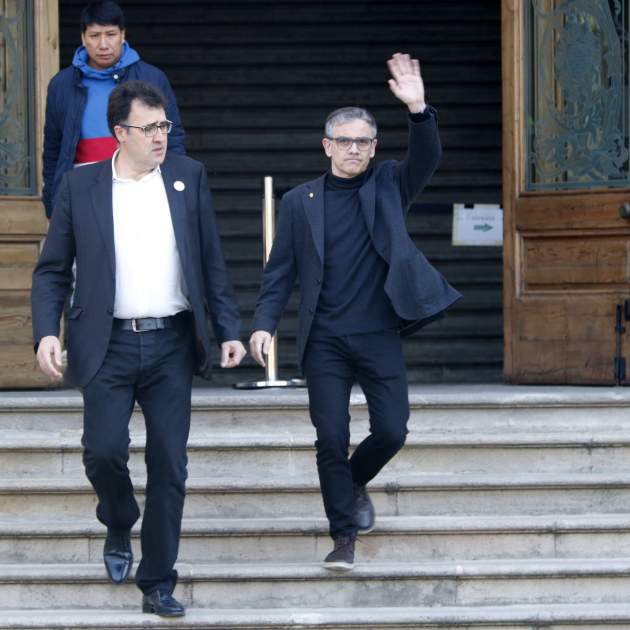Tossed aside. The reform of Spain's law on misuse of public funds, promoted by the Catalan Republican Left and expected to affect some of the former Catalan government officials whose trial over the October 1st referendum is still pending, has been definitively tossed away this Monday with the resolution of the Supreme Court's criminal chamber, presided over by Manuel Marchena. The court has refused to apply the 'attenuated' variant of misuse of funds, included in the Penal Code reform, and instead, maintains the bans on public office that those convicted in the 2019 trial already had: until 2031 for Oriol Junqueras and Dolors Bassa and until 2030 for Raül Romeva and Jordi Turull. This position, which was already backed with regard to the exiled Catalan politicians by judge Pablo Llarena and the chief public prosecutor, will directly harm the Catalan officials who were economy and finance undersecretaries in 2017, the ERC politicians Josep Maria Jové and Lluís Salvadó, pending trial in the High Court of Catalonia (TSJC), along with with the current Catalan culture minister, Natàlia Garriga, who is only being tried for disobedience. The prosecutors in the case were to present the indictment last week and, now that the Supreme Court's resolution has been issued, they have all the guarantees required to demand that Jové and Salvadó be charged with the 'aggravated' misuse of funds crime, which, if the expenditure exceeds 250,000 euros, can be punished with up to 12 years in prison. The case against president Carles Puigdemont, and former ministers Toni Comín and Lluís Puig, prosecuted for misuse of funds and disobedience, is also facing this same threat.
Last November, the TSJC ordered the trial of the culture minister Garriga and ERC deputies Jové and Salvadó for their role in the preparations for the 2017 independence referendum when they held senior positions in the Catalan economy and finance department. The two Republican MPs are being prosecuted for disobedience, abuse of authority, misuse of public funds and disclosure of secrets. These last two offences can involve high prison sentences. The court to hear the trial of the two politicians is made up of the president of the TSJC, Jesús María Barrientos, Carlos Ramos and Fernando Lacaba.
ERC rejects misuse of funds
Andreu Van den Eynde, lawyer of the ERC leaders convicted in the 2019 Supreme Court trial, has defended that the expenses incurred in the organization of the referendum on Catalonia's self-determination does not fit into any crime of misuse of funds, because, as he maintains, the government carried out an action requested by the citizenry. For her part, in the updated charge list against Catalan president Carles Puigdemont and his fellow exiles, the state solicitor has argued that the 'attenuated' version of misuse of funds, created in last year's Penal Code reform, should be applied to them because there was no enrichment, either personal or of third parties. And, therefore, it is expected that the state solicitor will also ask for the same charge to be laid against Jové and Salvadó. Judge Pablo Llarena, however, asserts that dedicating public funds to an unofficial purpose is an inappropriate use which is contained in the misuse of funds law, not that of disloyal administration, and now, the criminal chamber of the Supreme Court, made up of six judges, colleagues of Llarena, has concurred. ERC leaders, such as Marta Rovira, have also interpreted Llarena's resolution as a clear persecution of the Catalan independence movement.
The penal reform, promoted by pro-independence ERC and agreed with Spain's senior government coalition party, the PSOE, sought to ensure that - among other ends - the former government officials would not have to face penalties like those imposed in 2019 on the political leaders. The new attenuated crime of misuse of funds (art. 433 of the Penal Code) punishes the diversion of budget expenditure with from one to four years in prison and a ban on office of up to six years if there is a serious impact on the service. Now, however, the prosecutors could demand twice as heavy a penalty.
Defendants in other pending cases over 1st October, also affected
Marchena's resolution also directly affects some eighteen people prosecuted for misuse of funds and document falsification who are included in the thirty Catalan government officials and businesspeople accused of playing roles in the organization of the 1st October vote, investigated by the Barcelona court number 13 and who have been long awaiting a trial before section 21 of the Barcelona Audience. In addition, there are ten people under investigation in Barcelona court number 18 for over the Catalan government's spending abroad on promoting the independence of Catalonia . This case and that of court 13 are awaiting a Barcelona Audience resolution over jurisdiction and the question of whether the two cases should be combined.
